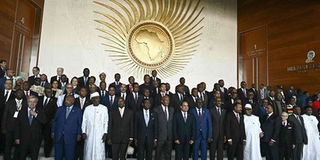Chaos at AU, and the fruits of walking next to Uhuru

Heads of States and officials stand for a family photo during the African Union summit in Addis Ababa on February 10, 2019. PHOTO | SIMON MAINA | AFP
What you need to know:
- Now in the AU hall, the presidents have their name placards and they are sorted. But there is some wiggle room in how their entourage sits behind them.
- And, more importantly, who walks in with the chief because, again, those moments are captured in photographs.
Africa’s Big Men met in the Ethiopian capital, Addis Ababa, for their regular yearly African Union summit.
Those following it on live TV and social media were treated to chaotic scenes, lots of shoving, and punching, by Ethiopian security and leaders’ security guards, at the entrance to the meeting.
President Uhuru Kenyatta ended up entering sans his aides. Uganda’s President Yoweri Museveni is shown, hands folded, hat firmly on the head, at a distance looking bemused.
For those who have followed proceedings at the AU, this is not uncommon. Quite often the entrances during summits descend into bedlam.
You would think Ethiopia, where the AU and its predecessor the Organisation of African Unity (OAU) has been headquartered for 56 years now, would by now become past masters at handling the summit. But no, almost every other year, they fluff it.
MANAGEMENT
Which is remarkable, considering the Ethiopians are quite good at some things: fighting wars, building railways, ending the ravages of famines, building export zones and business parks, and they are the best Africans at running an airline.
So why is ushering an AU summit such a problem? To get to the answer, we need to recognise that it is not an Ethiopian, but an Africawide, problem.
For example, barring one or two countries, no matter how many times we hold elections, and whether or not they are going to be stolen, it is always a mess.
Polling stations open late, wrong materials arrive at the voting sites, long winding queues form, computers and other electronic voting machines break down, electricity goes off, and so on and so forth.
CHAOS
And when it comes to counting the votes, election officials become fat-fingered, everyone forgets how to add, and the network for transmitting results mysteriously fails.
Party primaries are running battles, and officials regularly emerge with swollen faces. Party delegates conference are no better, with members scuffling and hurling chairs.
Examination time is also frequently hit by the same problems, with papers going to wrong centres, or not arriving at all, despite the fact that we have been administering this ritual for over 60 years.
This is a different problem from, for example, the fights over food and drinks at funerals, because you don’t have institutional memory there.
There is no one whose job it is to get up every couple of weeks to arrange funerals for the same family.
DELEGATES
Someone who thinks he knows what is at play at places like the AU, delegates’ conferences, and elections, tells me there is a premium in these places in having confusion.
That where power and privilege are being allocated, or an outcome results in someone gaining power, there is no profit in order.
I thought about it, and he could have a point. Let us start with a party delegates’ conference.
The leaders are seated in front, and therefore they will see the delegates who are in the front. The ones at the front are also the ones who will be captured in NTV’s live coverage.
They are the ones who are photographed, and end in the papers. They are also the ones who will shake the party chiefs’ hands.
RECOGNITION
If you are seated at the back, you will miss all that. Without you telling people, they will not know you were there.
And the party chiefs will also not know that you were there. When they are dividing the spoils of victory later, the fellows who were at the front will be remembered first.
Therefore, the question of who gets through the door first, and sits close to the front, is a big deal. People will fight over it, and the guards who decide when you enter, in that way have redistributive power.
It does not matter at a Safaricom annual general meeting if you sit behind, or even attend at all, especially in a year when no board votes are coming up. Your dividend cheque will still come in the mail.
PRESENT
Now in the AU hall, the presidents have their name placards and they are sorted. But there is some wiggle room in how their entourage sits behind them.
And, more importantly, who walks in with the chief because, again, those moments are captured in photographs.
They never capture the one who walks in at the tail of the big man’s entourage.
And when Uhuru is entering the hall and runs into Ghana’s President Nana Akufo-Addo, the official he will introduce is the one immediately to his left or right. He will not turn and call the bloke who is five metres back.
That one will have no reason not to wash his or her hands, because they will not greet anyone special that day. These things matter.
Mr Onyango-Obbo is the publisher of Africapedia.com and explainer Roguechiefs.com. @cobbo3





